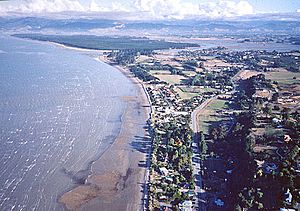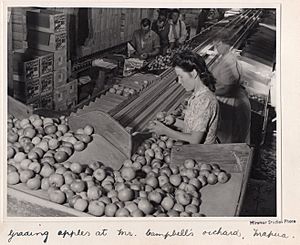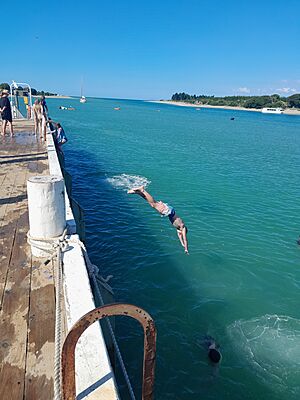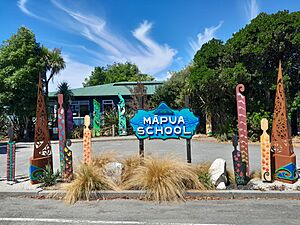Māpua, New Zealand facts for kids
Quick facts for kids
Māpua
|
|
|---|---|
|
Village
|
|

Photo taken from a hang glider above Ruby Bay cliffs
|
|
| Country | New Zealand |
| Territorial authority | Tasman |
| Ward | Moutere-Waimea Ward |
| Electorates |
|
| Area | |
| • Total | 2.71 km2 (1.05 sq mi) |
| Population
(June 2023)
|
|
| • Total | 1,630 |
| • Density | 601.5/km2 (1,558/sq mi) |
| Time zone | UTC+12 (NZST) |
| • Summer (DST) | UTC+13 (NZDT) |
| Area code | 03 |
Māpua is a small town located in the South Island of New Zealand. It is found west of Nelson along State Highway 60. The town sits right on the coast of Tasman Bay.
Māpua is a popular spot for visitors, especially during the summer. It has a busy wharf and a lively commercial area. Every Easter Sunday, Māpua hosts a large fair and market. Up to 10,000 people come to enjoy the rides, stalls, and other fun activities. This fair is very important for local schools and playcentres, as it helps them raise money.
Contents
History of Māpua
Early Māori Settlements
Long ago, Māori people lived in small settlements around Māpua. Tools, bones, and shell heaps (called middens) have been found in the area. These findings suggest that Māori lived here seasonally. A major fortified village, known as a pā, was located on the Kina Cliffs to the north. You can still visit this site today.
The Māori people in this area were generally peaceful. They rarely fought wars, and there is little evidence of weapons or cannibalism. However, in the late 1820s, Māori warriors from the North Island arrived. They were led by Chief Te Rauparaha and carried muskets, which were new and powerful weapons.
Te Rauparaha's army took over the Marlborough Region. Then, half of his army moved west to conquer Tasman Bay / Te Tai-o-Aorere and Golden Bay. Because the invaders had better weapons and fighting skills, they quickly defeated the local Māori. After the battles, most of the invaders left, leaving only a small number of local Māori in the region.
European Settlement and Growth
The first European to buy land in Māpua was Captain James S. Cross in 1854. He bought 166 acres for 60 pounds. The first European to live in Māpua was James Heatly. He was a fisherman who also hunted rabbits to sell in Nelson.
The port area was first called the Western Entrance. The town itself was named Seaton Township by a surveyor. Later, Mr. F.I. Ledger helped plan the town and named it "Mapua." The name Māpua means "abundance" or "prolific" in English.
By 1915, Māpua had a large wharf. This wharf could handle big ships that came to collect apples. The apple trade was very successful at this time. Roads were poor, so shipping apples by sea was the best way to transport them. Eventually, a road was built around the Ruby Bay bluffs. This road connected Nelson with Motueka. A shop opened in 1921 to serve the local people. This shop still stands on the same land today. The town's name was officially changed to Māpua on November 5, 2018.
Māpua's Cleanup Project
In the 20th century, Māpua became one of New Zealand's most contaminated sites. This was due to leftover pesticides from a factory that used to be there. However, a big cleanup operation took place in the 21st century.
In 1932, the Fruitgrowers Chemical Company built a factory in Māpua. This factory made pesticides for the many fruit orchards nearby. The factory closed in 1988. In 1989, the Tasman District Council took over the site. They worked to stop chemicals from leaking into the nearby Waimea Inlet.
In 1999, money was given for a cleanup program. The plan was to process the chemicals right there on the site. In 2001, the Tasman District Council hired companies to do the cleanup. They used a special method to remove the harmful chemicals. The site was successfully cleaned and given back to the Tasman District Council in November 2007.
People of Māpua
Māpua is a rural settlement. In 2018, Māpua had a population of 1,143 people. This was an increase of 120 people since 2013. Most people in Māpua are of European descent. A smaller number are Māori, Asian, or other ethnicities.
Many people in Māpua have no religious beliefs. Others are Christian or follow other religions. About 29% of people aged 15 or older have a university degree. About 41% of people aged 15 or older work full-time.
Education
Māpua School is a primary school for students from Year 1 to Year 8. It is a co-educational school, meaning both boys and girls attend. As of 2023, the school has about 240 students.
Mountain Biking Adventures
Māpua is a stop on the Tasman's Great Taste Trail. This is a popular mountain bike trail. It connects several towns, including Nelson, Wakefield, Richmond, Motueka, and Kaiteriteri. It's a great way to explore the region by bike.





